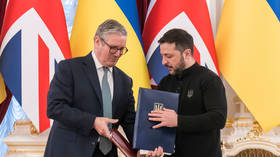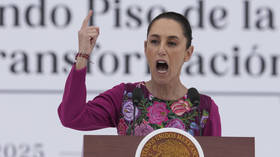Russia will only borrow in currencies other than US dollar – finance minister
Russia will not take out loans in US dollars for the remainder of this year and the whole of 2020, turning instead to the yuan and euro, according to the Finance Ministry.
“We will borrow in currencies other than the dollar,” Russian Finance Minister Anton Siluanov said on Thursday. He added that the country will not be taking any more loans in 2019.
“This year we have no plans to borrow any more on foreign markets, we have fulfilled our program and even overfulfilled it. Next year, we’ll see. Probably it will be not only in euro but maybe in Chinese yuan,” Siluanov stated.
Also on rt.com Russia to sell debt in Chinese yuan as Washington weaponizes dollarBack in March, Russia’s Finance Ministry issued Eurobonds worth €2.7 billion ($3 billion) with a maturity date in 2035. It also separately issued Eurobonds worth €750 million ($830 million) with a maturity date in 2025. In June, the Finance Ministry also placed additional Eurobonds worth €1.37 billion ($1.5 billion) with a maturity date in 2029, and €900,000 ($1 billion) with a maturity date in 2035.
Earlier, it was revealed that Moscow and Beijing are working on a new way of cutting their reliance on the US dollar, as Russia plans to issue its first yuan-denominated bond. The move is aimed at assisting both countries’ economies in dealing with US tariffs and sanctions. The proposal will also allow Moscow to extend its list of foreign creditors. While Chinese investors do not buy Russia’s ruble-denominated bonds, the launch of the yuan bonds would give them an opportunity to invest in Russian state debt.
Also on rt.com Golden rule: Russia brings bullion & foreign currency reserves to new highsMeanwhile, due to steadily growing gold and foreign currency reserves, Russia’s state-debt-to-GDP ratio last month turned negative for the first time since 2014, when the country’s economy was battered by Western sanctions and the oil market crash. As of August 1, Russian state debt (at federal, regional and municipal levels) amounted to 16.2 trillion rubles (around $247.3 billion). At the same time, liquid assets of federal government, regional authorities and non-budget funds stood at 17.6 trillion rubles (nearly $268.8 billion).
For more stories on economy & finance visit RT's business section














